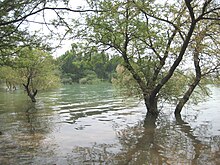Tanda Dam or Tanda Lake is a small dam and also a lake view park located in the Kohat District of the Khyber Pakhtunkhwa province of Pakistan.[2] The dam supplies water for irrigation to Jurma, Tappi, Baqizai, Dhoda, Shahpur and many other villages by means of canals from Tanda Lake.
| Designations | |
|---|---|
| Designated | 23 July 1976 |
| Reference no. | 98[1] |

It became operational on 17 July 1967, though it was inaugurated by the then president Ayub Khan in 1962.[3] Covering an area of 405 ha (1,000 acres),[4] Tanda Dam had the initial capacity to store 65,000 acre feet of water and provide a perennial supply of 260 cusecs of water for irrigation.[citation needed]
Tanda Lake is a protected site under the Ramsar Convention,[5] an international treaty for the conservation and sustainable utilization of wetlands. It was included as a Ramsar site on 23 July 1976. The lake is home to migratory birds from Siberia and the Caspian during winter.[6]
Incident
editOn 29 January 2023, 49 children and two adults drowned when their boat capsized on the dam. The boat they were travelling on was carrying people on a daytrip from a local madrassa when it overturned.[7][8]
Reference
edit- ^ "Tanda Dam". Ramsar Sites Information Service. Retrieved 25 April 2018.
- ^ "A tourist resort has approved by converting Tanda Dam into Lake View Park". Dawn Newspaper. Retrieved 29 August 2018.
- ^ "1967 : Fifty years ago : Tanda Dam completed". The Dawn. 18 July 1997. Retrieved 7 June 2020.
- ^ "Tanda Dam". Ramsar Sites Information Service. Retrieved 7 June 2020.
- ^ " Sakafat-e-Kohat " written by Ahmad Paracha.
- ^ "Special Feature on Tanda Dam". Radio Pakistan (PBC Kohat). 17 July 2019. Retrieved 7 June 2020.
- ^ "Pakistan: 49 children drown after overloaded boat capsizes in lake". The Guardian. 31 January 2023. Retrieved 1 February 2023.
- ^ "More than 50 die in two Pakistan accidents". BBC News. 29 January 2023. Retrieved 30 January 2023.
External links
edit- A site with GoogleMaps for Ramsar sites in Pakistan Archived 2007-02-12 at the Wayback Machine